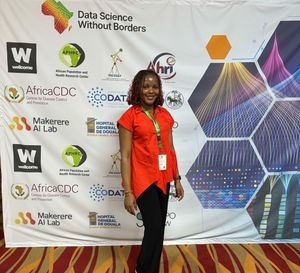As an open source manager at OSPO Now, my role involves helping our clients build out and maintain their open source initiatives.
I recently traveled to Mombasa, Kenya, to conduct a training session on open source strategies and practices for African health professionals. African Population Health Research Center (APHRC) organized the training as part of the Data Science Without Borders Project. The training aimed to help participants learn how to standardize healthcare data from various sources into a unified structure, which is crucial for accurately analyzing medical and health outcomes. I had the chance to dive into something close to my heart, open source, and share how this practice can be integrated into Open Science research.
This two-part blog series will first explore my experience as a trainer, followed by a deep dive into the questions and answers from the training session. The experience was enriching, and I'm excited to share how the session unfolded and the key insights gained.
The Training Experience
My role as a facilitator was not just to impart knowledge, but to empower scientists with the practical skills to integrate open-source technology with Open Science research. The training, which included a lecture and a hands-on session, was designed to be practical and applicable. The lecture introduced open source, its history, and its relation to Open Science. At the same time, the hands-on session allowed participants to apply what they had learned by working on their first open source contributions using Github.
After a brief recap of the previous sessions, we introduced the Swahili word of the day, 'sawa sawa,' meaning 'okay, okay,' a phrase I'll definitely add to my vocabulary! Afterwards, it was my turn to take the floor for my session covering a range of topics, including an Introduction to Open Science, the Reproducibility Crisis, Credibility Revolution, and how Open Science is shaping the future of research. We then dived into the world of open source, its history, and the importance of open source software in scientific research and discovery. Finally, we wrapped things up with open-source software management and workflows using GitHub. It was a packed day, but I could feel the curiosity in the room.
Practical Session
After a much-needed lunch break, we dove into the practical session. I guided participants through their first open-source project contribution. We began with the fundamentals; creating GitHub accounts and setting up repositories with essential components like a Contributor's Guide, Code of Conduct, and licenses. We then explored key concepts such as branching, committing code, pull requests, forking, and code review. It was inspiring to witness participants actively engage with each other's projects. The room was buzzing with energy.
For the exercise, the participants were asked to create a GitHub account and a simple markdown file where they added their favorite quotes. The idea was to get them comfortable saving and managing their work and collaborating with others. They added their quotes to other participants' files, giving them hands-on experience with collaboration and how contributions work in open-source projects. The session had fantastic engagement from the attendees, seeing so many of them getting involved and applying the concepts in real time was great!
Challenges faced
Teaching a non-developer audience how to navigate GitHub comes with challenges. The most prominent of which was navigating GitHub’s user interface, such as navigating to particular pages. Time was spent with individuals, making sure everyone was comfortable navigating between pages.
Another interesting challenge was branching. GitHub’s user interface offers multiple ways to do the same task, which led to confusion as participants stumbled across different ways to do the same thing. However, this just gave me the opportunity to guide everyone through the different approaches and by the end of the day, everyone could navigate the user interface in a unique way.
Lessons Learned
As a facilitator, answering participants' questions and guiding them through challenges provided valuable insights into how I can improve future lectures, especially for open source beginners.
In future sessions, we will place more emphasis on GitHub’s interface, with more detail on navigation throughout the platform.
While preparing for the lecture, I deepened my understanding of Open Science, its history, and its evolving role in scientific research. This was especially meaningful to me given my background as a scientist (I am a microbiologist by training). It reminded me that I can always combine my technical and open source knowledge with my roots in science. Gaining more insight into open science has been a boost, opening up more possibilities for merging both worlds.
Next Steps
I encouraged participants to continue exploring what they learned and take the next step by starting their own open-source projects or finding existing ones related to their field of science. Open source is all about collaboration and sharing knowledge, so many exciting opportunities await. Whether contributing to a project that aligns with your research interests or creating something new, every bit of involvement helps the community grow. Don’t hesitate to jump in, try things out, and learn along the way, it’s a great way to grow your skills and impact the world of science.
Reflection
Overall, the experience of training scientists on open source was fulfilling. Seeing them get involved, ask questions, and try the hands-on activities were great, even when some parts were tricky. It was a highlight to watch them use tools like GitHub for the first time and learn how open source works. It reminded me how valuable open source can be in any field, especially in science, and how it can change research and teamwork.
A gratifying part was their eagerness to understand how open source could help their work. Helping them grasp the technical steps and the more significant ideas behind open source felt meaningful. I am confident they saw the value of Open Source and how it can significantly impact their scientific research.
We will be posting a second blog soon covering some of the most common questions I was asked during the training session.


